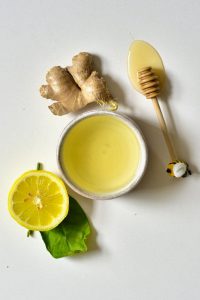What Tea Helps with Bloating
Several types of tea can help alleviate bloating and digestive discomfort. Here are some teas that are known for their potential to aid in reducing bloating:
Peppermint Tea: Peppermint tea is a popular choice for soothing digestive issues, including bloating. It contains compounds like menthol that can relax the gastrointestinal tract muscles and relieve gas and bloating.
Ginger Tea: Ginger has long been a natural remedy for digestive problems. Ginger tea can help reduce bloating and gas by promoting food movement through the digestive system and reducing inflammation.
Fennel Tea: Fennel seeds contain compounds that can relax the muscles in the gastrointestinal tract and reduce bloating and gas. Fennel tea is a mild and pleasant way to consume fennel for digestive relief.
Chamomile Tea: Chamomile tea has anti-inflammatory and soothing properties that can help alleviate bloating and ease digestive discomfort. It may also help relax the muscles of the digestive tract.
Dandelion Tea: Dandelion tea is believed to have diuretic properties, which can help reduce water retention and bloating. It may also support liver function, which can contribute to better digestion.
Cinnamon Tea: Cinnamon is known for its potential to help regulate blood sugar levels, which can indirectly reduce bloating and digestive discomfort. Cinnamon tea can be a flavorful and beneficial choice.
Lemon Balm Tea: Lemon balm is a gentle herb that may help soothe digestive issues, including bloating. It can have a calming effect on the stomach and promote healthy digestion.
Green Tea: Green tea contains antioxidants and compounds that may help improve digestion and reduce bloating. It can also provide a mild energy boost, enhancing overall well-being.
When using tea to alleviate bloating, brewing it properly and enjoying it in moderation is essential. If your bloating persists or is severe, it’s advisable to consult with a healthcare professional, as it could be a sign of an underlying digestive issue or food intolerance that requires medical attention. Additionally, some individuals may be sensitive to certain herbs or teas, so it’s a good idea to monitor your body’s response when trying new remedies.
Understanding Bloating
Before diving into the teas, let’s first understand what bloating is and what causes it.
Bloating is the sensation of fullness and tightness in the abdomen, often accompanied by gas and discomfort. It can be caused by various factors, including:
Excessive Gas
One of the primary culprits behind bloating is excess gas in the digestive system.
Overeating
Consuming large meals or eating too quickly can lead to bloating.
Food Intolerances
Certain foods, like dairy or gluten, can trigger bloating in individuals with intolerances.
Constipation
When stool builds up in the colon, it can result in bloating.
The Magic of Tea
Now that we’ve got a handle on bloating, let’s explore how tea can help alleviate this uncomfortable condition.
Herbal Remedies
Peppermint Tea
Peppermint tea is a popular choice for soothing bloating. It contains menthol, which can relax the gastrointestinal tract muscles and reduce gas.
Ginger Tea
Ginger has anti-inflammatory properties that can ease bloating and promote healthy digestion. A warm cup of ginger tea can do wonders.
Traditional Favorites
Chamomile Tea
Chamomile tea has been used for centuries to calm upset stomachs and reduce bloating. It’s particularly effective for those with indigestion-related bloating.
Green Tea
Green tea is packed with antioxidants that support digestion. It can help reduce inflammation and alleviate bloating.

Special Blends
Fennel Tea
Fennel tea is known for its carminative properties, making it excellent for reducing gas and bloating. It’s a flavorful choice that can ease discomfort.
Dandelion Tea
Dandelion tea is a natural diuretic, helping the body flush out excess water and reduce bloating. It’s also rich in potassium.
How to Brew the Perfect Cup
Now that you know which teas can help with bloating, let’s discuss the art of brewing the perfect cup.
Boil Fresh Water
Start with fresh, cold water to ensure the best flavor. Bring it to a boil.
Choose Quality Tea Leaves
Select high-quality tea leaves or tea bags for the best results. Organic options are a great choice.
Proper Steeping Time
Each type of tea has its optimal steeping time. Follow the instructions on the package for the perfect cup.
Enjoy Slowly
Sip your tea slowly, making it work magic on your digestive system. Avoid adding excessive sugar or milk. Don’t Forgot to Check Out Website: Peer Life Style
Conclusion
With its diverse flavors and soothing properties, tea can be a valuable ally in the battle against bloating. Whether you opt for peppermint, ginger, chamomile, green tea, fennel, or dandelion tea, you’ll find a natural remedy that suits your taste. So, the next time you experience bloating, reach for a cup of tea and experience its comfort.
FAQs
Q1: Can I drink tea throughout the day to prevent bloating?
You can enjoy tea in moderation throughout the day to help prevent bloating. Just be mindful of caffeine intake, especially in the evening.
Q2: Are there any teas I should avoid if I have a sensitive stomach?
If you have a sensitive stomach, avoiding highly caffeinated teas and those with added artificial flavors is best. Stick to herbal options like chamomile or ginger.
Q3: How quickly can I expect relief from bloating after drinking tea?
The time it takes for tea to alleviate bloating can vary from person to person. Some may experience relief within minutes, while others might need an hour or so.
Q4: Can I sweeten my tea to make it more enjoyable?
You can add a touch of honey or a splash of lemon juice to your tea for added flavor. Just go easy on the sweeteners to keep it healthy.
Q5: Is it safe to drink tea during pregnancy to relieve bloating?
Drinking certain herbal teas like ginger or peppermint during pregnancy is generally safe. Still, it’s always best to consult your healthcare provider to ensure it suits your situation.

